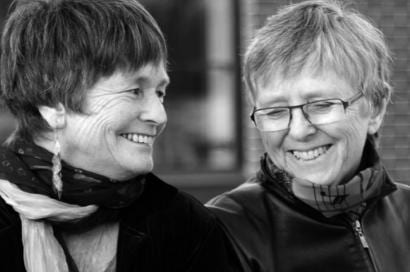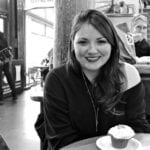
Andrews and her partner, Jennifer Cayley, now run their own storytelling company, 2 Women Productions. Credit: Alan Dean Photography
Young or old, most gays can relate to an identity crisis.
Female storyteller Jan Andrews, 69, remembers being a young child and wanting to be a boy.
As this month’s featured Once Upon a Slam storyteller, Andrews plans to combine literary fiction, her childhood gender-identity experiences and memories of coming out as a lesbian late in life.
The monthly series highlights the art of storytelling, through both fictional and real-life tales.
“I thought about how much as a kid I had wanted to be a boy, but it was a really different time, and I was never going to go down that path. It made me think about what was happening in my life,” says Andrews. “The good things that confusion can bring to you and also this sense of turmoil.”
Andrews will present her piece, Who Wants the Dress, on Nov 25 in combination with a story written by Sara Maitland. Maitland’s story is the tale of a young man who must dress in women’s clothes to take part in a seal hunt.
Ruthanne Edward, the organizer and slam master of Once Upon a Slam, says the first time she heard Andrews’ piece, she knew she wanted more people to hear it.
“I spoke with someone afterwards who had seen it, and [she] said it felt like it gave her the ability to speak as well,” says Edward. “Jan has a different perspective and she comes from a different time . . . But at the same time, it’s these identity things that people can find in their own lives.”
Andrews came out as a lesbian in her late 40s, after having two children. Andrews and her partner, Jennifer Cayley, now run their own storytelling company, 2 Women Productions.
“We carry with us very strongly the weight and the shadows of our upbringing. So if you take a group of people who, yes they’ve come out and they are out in the world, but so strongly in their youth they couldn’t exist, that’s always there,” says Andrews. “We’re looking at the fact that so little artistic work reflects the life of older lesbians. Of those of us who come from a time where when I was growing up, gay men could go to jail. We didn’t know any lesbians.”
Andrews and Cayley collaborated on The Book of Spells, about their relationship.
“It was about falling in love, thinking it would be wonderful, but actually it was really hard to work through,” says Andrews. “We worked through it and didn’t give up our individuality. That’s what came out of the show for younger people. Younger women saw it was difficult but could see through it.”
Andrews says her story of coming out later in life gives a voice to a part of the community that doesn’t have much representation in the arts. For women who were married and then came out as lesbians, it’s good for them to see that they’re not alone.
“The way people have worked to be accepted in the world, it’s highly politicized,” Andrews says. “For example, Ivan Coyote has a piece up now about the pressures towards butch women. Asking why she’s not transgendered. Why aren’t we just supportive of one another? And the femme women have another kind of prejudice in the queer community. This seems to me bordering on insanity.”
It is difficult to change people’s minds about identity issues, especially when it comes to gender, Andrews says.
“There will always be a back and forth in dealing with who you are and what you want to be. I’m stunned you can’t get support from your community to live the way you want to. Those to me are the issues as to why I chose to speak in the way I do.”
Edward says there are many voices not heard within the queer community and elsewhere, which is evident in the persistence of homophobia and transphobia. She thinks storytelling speaks to people in a way that allows them to identify and understand some of these issues.
“To see a regular person stand onstage and say, ‘This was my experience; this is my life,’ is empowering and gives people space to tell their stories,” Edward says. “They may not get onstage, or write a poem, or tell a story, but they may tell a friend or their family.”
The Deets:
Jan Andrews
Once Upon a Slam
Fri, Nov 25 at 6:30pm
Mercury Lounge, 56 Byward Market
$8


 Why you can trust Xtra
Why you can trust Xtra


